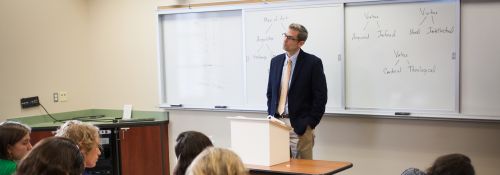
Faculty Spotlight: Jeffrey Lehman
Written by Monica VanderWeide
Hillsdale’s new assistant professor of education, Dr. Jeffrey Lehman, identifies Augustine as one of his favorite authors, because Augustine “focuses upon the most important things for our journey in this life—pursuing the truth and embracing love.” And Lehman believes that the liberal arts help students to approach those most important things.
Lehman heard about Hillsdale years ago, when he attended several CCAs and talked to friends who worked at Hillsdale, including Dr. Stephen Smith of the English Department. When he heard about an education position opening up, it “seemed like a good fit, given my experience teaching the liberal arts and my commitment to classical education through the great books.” Upon being hired to teach at Hillsdale, Lehman, his wife Jennifer, and their four children packed up and moved from southern California—where he had taught at both Biola University and Thomas Aquinas College—to Michigan. While some pity him for leaving California for the Midwest, Lehman says, “I love the seasons and I love the way Midwesterners approach life—it is very personal, very family-oriented.”
This semester, Lehman is teaching three courses. He coordinates the Education Department’s liberal arts teacher apprenticeship program, in which Hillsdale students observe and teach classes at Hillsdale Academy or at other classical schools around the country. He is also teaching “Logic and Rhetoric” and “Quadrivium,” a course on the role of arithmetic, geometry, music, and astronomy in a liberal education. He wants to teach his students the foundational role of these classical liberal arts and how they are the starting point for a liberal education. But, as he is the first to admit, “they are just the beginning.”
Lehman explains that the ultimate goal of a liberal education is to “free the learner from ignorance and vice,” and that there is a danger in narrow, specialized undergraduate education: “Focusing on a tiny part of the whole, you can easily lose your bearings; a narrow approach can leave you so preoccupied with specific details that you forget thinking about the bigger questions.” In contrast, the liberal arts help students to consider the world of our experience from different vantage points, and to articulate their questions and observations about the deeper significance of their studies.
In the spring semester, Lehman will offer a course in “Master Teachers in the Western Tradition.” This course will explore the writings of great teachers throughout Western history, including Socrates, Plato, Aristotle, Moses, Jesus, Augustine, Boethius, Thomas More, and Shakespeare.
Hillsdale’s Education Department also serves in an advisory role for Hillsdale’s Charter School Initiative. Lehman is supportive of this endeavor, as “it is an important way that we can positively influence the future of public education in the United States.” Charter schools committed to classical education, he says, “recapture what has been lost in contemporary education, while not simply burying themselves in the past; they orient students to face the challenges of the future armed with the greatest insights of the past.” In supporting the liberal arts at the elementary and secondary levels, he says, “Hillsdale College is being true to its mission of pursuing truth and defending liberty.”
This article was originally published in the Spring 2014 edition of Hillsdale: The Official Magazine of the Hillsdale College Alumni Association.